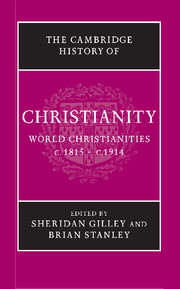Book contents
- Frontmatter
- 1 Introduction
- PART I CHRISTIANITY AND MODERNITY
- 2 The papacy
- 3 Theology and the revolt against the Enlightenment
- 4 The growth of voluntary religion
- 5 Catholic revivalism in worship and devotion
- 6 Women preachers and the new Orders
- 7 Church architecture and religious art
- 8 Musical trends and the western church: a collision of the ‘ancient’ and ‘modern’
- 9 Christianity and literature in English
- 10 Christian social thought
- 11 Christianity and the sciences
- 12 History and the Bible
- 13 Popular religion and irreligion in countryside and town
- PART II THE CHURCHES AND NATIONAL IDENTITIES
- PART III THE EXPANSION OF CHRISTIANITY
- Select General Bibliography
- Chapter Bibliography
- Index
- References
2 - The papacy
from PART I - CHRISTIANITY AND MODERNITY
Published online by Cambridge University Press: 28 March 2008
- Frontmatter
- 1 Introduction
- PART I CHRISTIANITY AND MODERNITY
- 2 The papacy
- 3 Theology and the revolt against the Enlightenment
- 4 The growth of voluntary religion
- 5 Catholic revivalism in worship and devotion
- 6 Women preachers and the new Orders
- 7 Church architecture and religious art
- 8 Musical trends and the western church: a collision of the ‘ancient’ and ‘modern’
- 9 Christianity and literature in English
- 10 Christian social thought
- 11 Christianity and the sciences
- 12 History and the Bible
- 13 Popular religion and irreligion in countryside and town
- PART II THE CHURCHES AND NATIONAL IDENTITIES
- PART III THE EXPANSION OF CHRISTIANITY
- Select General Bibliography
- Chapter Bibliography
- Index
- References
Summary
The nineteenth century was a period of paradox in the history of the Roman Catholic Church. It was an age of revival, especially through the growth of active religious orders of women, and the strengthening of Catholicism in areas in which it suffered from disadvantage or minority status – Germany, Holland, the British Isles and the English-speaking world–while coming under pressure or persecution in the traditionally Catholic Latin states of southern Europe and South America. Both renewal and decline had, however, a common strand, the new or neo-Ultramontane movement to exalt the authority of the pope as an inspiration for revival and a defence against decline among the ‘integrally’ religious. Neo-Ultramontanism was the trades unionism of priests resistant to bishops in France, the protection of bishops resistant to the state in Spain and Prussia, and the enthusiasm among converts from Protestantism to Catholicism resistant to various forms of unbelief in England, and among Catholics everywhere opposed to the seizure of the Papal States by the kingdom of Piedmont-Savoy between 1860 and 1870.
Neo-Ultramontanism upheld the traditionally Ultramontane doctrines of the infallibility of papal teaching in faith and morals and the universal jurisdiction of the Roman pontiff; it opposed the old Gallican theory, ascendant in the Catholic world before 1789, of an infallible authority restricted to general councils of the whole church, and of independent national churches effectively controlled by kings and states and acknowledging only a titular papal primacy. Gallicanism still prevailed in 1829, when, of the 646 diocesan bishops, the pope appointed only twenty-four outside the Papal States.
- Type
- Chapter
- Information
- The Cambridge History of Christianity , pp. 11 - 29Publisher: Cambridge University PressPrint publication year: 2005



